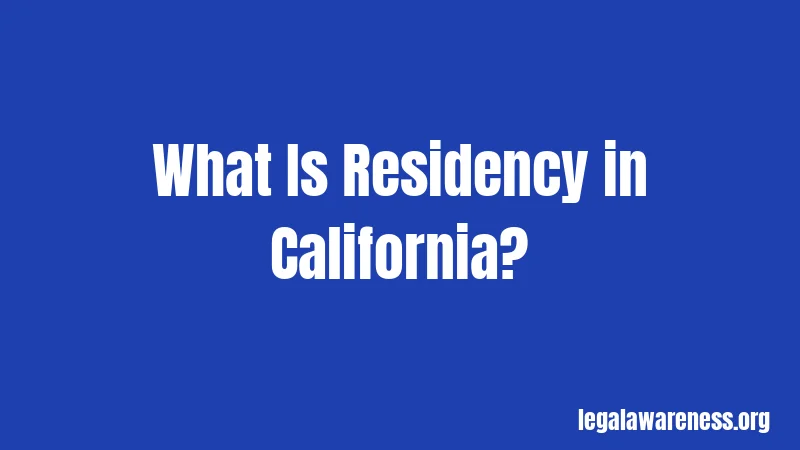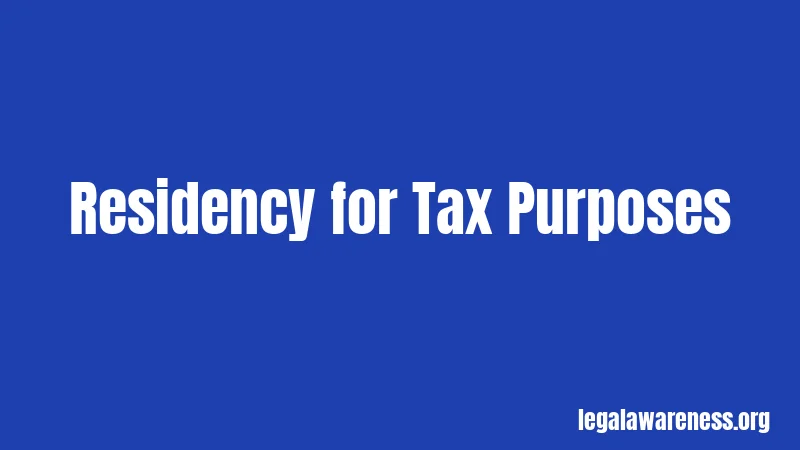California Residency Laws (2026): Your Complete Legal Guide
Most people have no idea how complex residency really is. You could live in California for years and still get it wrong. The good news? Once you understand the basic rules, it makes total sense.
California’s residency laws affect everything. Your taxes, voting rights, tuition costs, and driver’s license all depend on your residency status. Let’s break down exactly what you need to know.
What Is Residency in California?

Okay, here’s the thing about residency. It’s not just about where you sleep at night. It’s actually a legal determination based on multiple factors.
Think of it like this. You can physically be in California, but not be a legal resident. You could also establish residency faster than you’d expect. The state looks at your intent, your connections, and your actions.
California considers you a resident if you’ve established a permanent home there. You need to show you intend to stay and make it your primary place of living. It’s not complicated, honestly. But the specific rules? Those matter a lot.
Establishing California Residency
Here’s where things get interesting. California has pretty clear guidelines for what counts as establishing residency.
You need to live in California with the intention to make it your home. This is the big one. You can’t just be passing through. Your actions need to show you’re actually settling down there.
Practically speaking, establishing residency usually takes time. Most people establish residency within six months to a year. Some situations move faster. Others might take longer.
Several things help prove your residency. Having a California driver’s license is huge. Registering your vehicle in California matters. Voter registration counts too. Opening a bank account, getting utility bills in your name, or enrolling your kids in school all add up.
Wait, it gets better. You don’t need all of these. The state looks at the total picture. A few strong factors can establish residency even without everything.
The Intent Factor

This is probably the most important part, honestly. California cares about your intent to stay.
What does “intent” actually mean? It means you’re not planning to leave. You’re not keeping a home elsewhere and just visiting. You’re actually making California your permanent residence.
You express intent through your actions. Are you signing a lease? Buying a house? Registering to vote? These things show intent. The state essentially asks: “Does it look like this person is staying?”
Here’s the tricky part. Intent is subjective. Two people could do the exact same things. One might be considered a resident. The other might not be. It depends on the full picture.
That’s why documentation matters. Keep records of your lease, utility bills, voter registration, and driver’s license. These create a paper trail. They show you’re serious about living in California.
How to Establish Your Residency
Let me break down the practical steps. This is actually pretty straightforward.
First, get a California driver’s license. You have 10 days after moving to California to do this. You’ll need proof of residency anyway. Things like utility bills, lease agreements, or bank statements work.
Next, register to vote in California. This is easier than you think. You can do it online in minutes. It counts as strong evidence of residency.
Then, register your vehicle in California. You have 20 days to do this. Bring your out-of-state registration and proof of residency. This one’s really important. Vehicle registration is major proof.
Open a California bank account if you don’t have one. Transfer your banking there. This shows you’re establishing financial roots in the state.
If you rent, sign a lease in California. If you own, get your home in your name there. Having a residential address in California is pretty much essential.
Not sure where to start? The California DMV website has all the forms you need. Your local county clerk’s office can help with voter registration. Banks will walk you through opening accounts.
Residency for Tax Purposes

Okay, pay attention here. Tax residency is its own thing. You’re not alone if this confuses you.
California taxes residents on all income earned anywhere. If you’re a California resident, the state wants its cut. That includes out-of-state income, investment income, everything.
How does California decide if you’re a tax resident? They use what’s called the “statutory residency test.” Basically, if you’re in California for more than half the year, you’re likely a tax resident.
Hold on, there’s more to know. You can be in California less than half the year and still be a tax resident. It depends on your intent and whether you have a home here.
The Franchise Tax Board is California’s income tax agency. They’re the ones who decide this stuff. If you’re unsure about your tax residency, they have resources on their website.
Many people move to California and underestimate their tax obligations. Don’t be one of them. If you’re working in California, you probably owe California taxes. Even if you’re telecommuting for an out-of-state company.
Residency for Education and Tuition
Here’s where residency gets expensive. California universities charge way less for in-state students.
To qualify for in-state tuition, you need to establish California residency. But here’s the catch. It’s not automatic when you move to California.
You typically need to live in California for a full year before you qualify for in-state rates. Plus, you need to show intent to stay. Just moving somewhere for college might not be enough.
The thing is, if you’re a dependent student, your parents’ residency usually counts. If you’re independent, you need your own established residency. Financially independent students can establish residency faster. It depends on the specific school.
Each California university system has slightly different rules. UC schools have one set of requirements. State universities have another. Community colleges are different too.
Want to know the details? Contact your specific school’s admissions office. They handle residency determinations for tuition purposes. Get it right before you enroll.
Non-Residents and Out-of-State Status
Wondering if you’re still a non-resident? Let’s figure it out.
You’re a non-resident if you don’t meet California’s residency requirements. You might be in California temporarily. You might have a home elsewhere and be just visiting. You might not intend to stay permanently.
Non-residents still have some legal rights in California. You can drive here, work here, and do business here. You just don’t have the same status as a resident.
Non-resident status affects your taxes, voting rights, and tuition costs. Pretty much anything the state uses residency for will be different. Non-residents typically pay more for education and services.
Here’s the thing. Your residency status can change. Move to California with intent to stay? You’ll eventually become a resident. Move away and establish a home elsewhere? You’ll lose that resident status.
Military Members and Special Circumstances
Now here’s where it gets interesting. Military families have their own rules.
If you’re active military stationed in California, you might not establish residency automatically. Military members can choose to maintain their “home of record” instead. That’s the state where you were stationed when you entered the military.
Your spouse and dependents get to make their own choice. They can establish California residency. Or they can follow your home of record status. It’s flexible for military families.
Military retirees? Different story. Once you retire and separate from the military, regular residency rules apply. You’d need to establish California residency like anyone else.
This is important if you’re military. Talk to your military legal assistance office. They can help you understand your options.
Residency and Voting Rights
Basically, you need to be a California resident to vote in state elections.
To register to vote in California, you need to be a resident and a U.S. citizen. You also need to be at least 18 years old. Plus, you can’t have a felony conviction disqualifying you.
You can register to vote when you get your driver’s license. You can also register online at register to vote.ca.gov. Or register in person at your county clerk’s office.
The important part? Register to vote in the state where you actually live. Register in California if that’s your home. Don’t register in multiple states. That’s actually illegal.
Losing Your California Residency
Sound weird? It can happen pretty easily.
You lose California residency when you establish residency somewhere else. Move to another state with intent to stay? You’re no longer a California resident. That can happen quickly, actually.
When you move, update your driver’s license right away. Update your voter registration too. Notify your employer of the change. These things help establish that you’ve left California.
Your out-of-state residency will become official pretty quickly. Once you get an out-of-state driver’s license and register to vote there, you’re basically set. California won’t claim you as a resident anymore.
The tricky part? You might still owe California taxes on income you earned while you lived there. Leaving the state doesn’t erase past tax obligations.
Proof of Residency Documents
Let me give you the actual documents that count.
California accepts several documents as proof of residency. A utility bill is solid. Your name, the California address, and the billing date need to be on it. Most recent bills work best.
A lease agreement works too. Make sure it’s signed and dated. It needs to show your name and the California address.
Bank statements count as proof. Account statements from a California bank with your name and address are perfect. They need to be recent, though. Most agencies want documents from the last 60 days.
Actually, here’s something cool. You can use multiple documents together. You don’t need just one strong document. A few weaker documents add up.
Examples of acceptable documents include: wage statements, insurance documents, DMV records, property tax records, and voter registration confirmations. Keep copies of everything.
Residency for Benefits and Services
Here’s where residency starts affecting your wallet.
California offers benefits to residents. In-state tuition at universities. Reduced registration fees at community colleges. California resident discounts on hunting and fishing licenses. Some government assistance programs too.
Non-residents can’t access these benefits. You need to be an established resident to qualify. That’s pretty much the rule across the board.
Actually, timing matters here. Some benefits require a certain residency period. In-state tuition usually requires a year. Some programs might have different timelines.
Check with specific agencies if you need a certain benefit. They’ll tell you exactly what residency period you need. Don’t assume. Ask first.
Recent Changes to California Residency Laws
Okay, let’s talk about what’s changed recently.
California hasn’t made major changes to core residency laws in the past few years. The basic rules are pretty stable. But there have been some updates related to how residency is documented.
Remote workers have created some interesting situations. People are moving to California while working for out-of-state companies. This has raised tax questions. California is getting stricter about requiring taxes from remote workers living in the state.
If you’re working remotely in California, you probably need to pay California taxes. Even if your employer is in another state. This is a more aggressive stance than before.
Also, voter registration requirements have gotten stricter about residency verification. Make sure your voter registration matches your actual residence. That’s important now.
How to Handle Your Residency Status
Honestly, this is the part most people miss. Document everything.
Keep a file with your residency proof. Store your lease agreement. Save utility bills. Keep copies of your DMV documents. Having these ready is huge if questions come up.
Update your residency information when it changes. Don’t leave old addresses on your driver’s license. That creates confusion. Update voter registration when you move. Notify your employer too.
If you’re establishing new residency, do it deliberately. Get the driver’s license first. Register to vote. Register your vehicle. These official documents matter most.
Most importantly, be honest about your residency. Don’t claim California residency if you don’t actually live there. Don’t claim residency in another state if you’ve actually moved to California. The state figures it out eventually, and the penalties can be serious.
Frequently Asked Questions
How long does it take to become a California resident? Usually between 6 to 12 months of living in California with intent to stay. Some circumstances move faster. Military families might have different timelines. Talk to the specific agency involved if you’re in a unique situation.
Can I have residency in two states? No. You can only have legal residency in one state. You can have property or spend time in multiple states, but you can only legally reside in one.
Do I lose my California residency if I work out of state? Not if you maintain your permanent home in California and intend to return. Many Californians work in other states. Your residency depends on where your home base is and your intent.
What if I’m homeless? Can I still be a California resident? Yes. Residency can be established without owning or renting property. You can use a friend’s address, a mailing address, or a shelter address. You still need to show intent to stay in California, though.
How does California residency affect my taxes? If you’re a California resident, you must pay California income tax on all your income. Non-residents only pay tax on California-source income. This can be a huge difference financially.
Final Thoughts
Now you know the basics of California residency. It’s not as complicated as it sounds once you break it down.
The key takeaway? Residency is about where you actually live and where you intend to stay. Document it properly. Update your records when things change. And if you’re unsure, ask. The California DMV, county clerks, and tax authorities are there to help.
Stay informed, handle your paperwork, and you’ll be fine. When in doubt, look it up or talk to a legal professional who knows California law.
References
California Department of Motor Vehicles – Residency Requirements https://www.dmv.ca.gov/portal/driver-licenses-identification-cards/establishing-residency/
California Secretary of State – Voter Registration https://www.sos.ca.gov/elections/voter-registration/
California Franchise Tax Board – Residency for Tax Purposes https://www.ftb.ca.gov/about-ftb/tax-statistics-research-data/data-by-topic/income-tax-data.html
University of California – Residency for Tuition Purposes https://admission.universityofcalifornia.edu/
California State University – Residency Requirements https://www2.calstate.edu/apply/freshman
California Legal Information – Residency Information https://calic.org/
